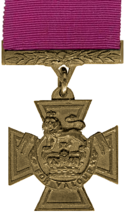Frederic Brooks Dugdale
Frederic Brooks Dugdale | |
|---|---|
 | |
| Born | 21 October 1877 Burnley, Lancashire |
| Died | 13 November 1902 (aged 25) Charingworth, Gloucestershire |
| Buried | Longborough Churchyard |
| Allegiance | |
| Service/ | |
| Years of service | 1899 - 1902 |
| Rank | Lieutenant |
| Unit | 5th Lancers |
| Battles/wars | Second Boer War |
| Awards | Victoria Cross |
Lieutenant Frederic Brooks Dugdale VC (21 October 1877 – 13 November 1902) was an English recipient of the Victoria Cross, the highest and most prestigious award for gallantry in the face of the enemy that can be awarded to British and Commonwealth forces.
Details
He was 23 years old, and a lieutenant in the 5th Lancers (Royal Irish), British Army during the Second Boer War when the following deed took place on 3 March 1901 near Derby, South Africa for which he was awarded the VC.
On 3rd March, 1901, Lieutenant Dugdale, who was in command of a small outpost near Derby, having been ordered to retire, his patrol came under a heavy fire at a range of about 250 yards, and a Sergeant, two men, and a horse were hit. Lieutenant Dugdale dismounted and placed one of the wounded men on his own horse; he then caught another horse, galloped up to a wounded man and took him up behind him, and brought both men safely out of action.[1]
He stayed with his regiment in South Africa until the war ended in May 1902, and left for the United Kingdom on the SS Briton two months later.[2] Shortly after his return, he was killed in a horse riding accident whilst riding with the North Cotswold Hunt, near Charingworth, Gloucestershire, England, on 13 November 1902.
The medal
His Victoria Cross is displayed at The Queen's Royal Lancers and Nottinghamshire Yeomanry Museum, Thoresby Park, Nottinghamshire, England.
See also
References
- ^ "No. 27356". The London Gazette. 17 September 1901.
- ^ "The Army in South Africa - Troops returning home". The Times. No. 36821. London. 16 July 1902. p. 11. template uses deprecated parameter(s) (help)
- Monuments to Courage (David Harvey, 1999)
- The Register of the Victoria Cross (This England, 1997)
- Victoria Crosses of the Anglo-Boer War (Ian Uys, 2000)
External links
- Location of grave and VC medal (Gloucestershire)
- Brief biography
- Biography from angloboerwar.com
- 1877 births
- 1902 deaths
- People from Burnley
- Deaths by horse-riding accident
- 5th Royal Irish Lancers officers
- Second Boer War recipients of the Victoria Cross
- British recipients of the Victoria Cross
- Accidental deaths in England
- People educated at Marlborough College
- Alumni of Christ Church, Oxford
- British Army personnel of the Second Boer War
- British Army recipients of the Victoria Cross
